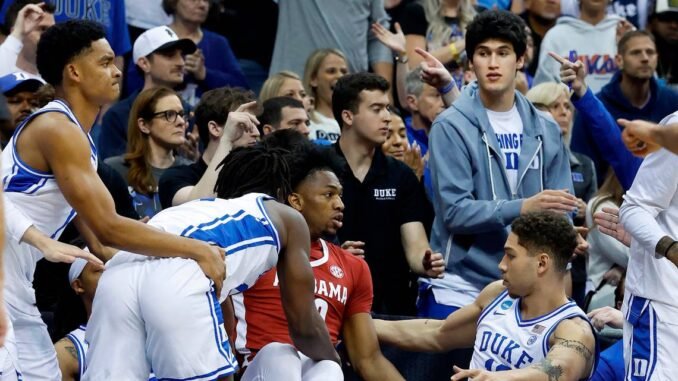
While most are focusing on defense in the upcoming Duke-Houston showdown, rebounding could be the real difference-maker. Securing the glass is always crucial, but it’s especially important against a physical and relentless team like Houston.
Houston’s identity is built on toughness, which extends beyond defense into rebounding. Controlling the defensive boards limits second-chance points and can lower Houston’s shooting efficiency.
Let’s look at the numbers:
Houston’s Top Rebounders:
- J’Wan Roberts – 6.3
- Joseph Tugler – 5.9
- Ja’Vier Francis – 5.1
- Mylick Wilson – 4.1
- Milos Uzan – 3.0
- Emanuel Sharp – 3.0
- Terrance Arceneaux – 2.7
- LJ Cryer – 2.3
Duke’s Top Rebounders:
- Cooper Flagg – 7.5
- Khaman Maluach – 6.8
- Sion James – 4.2
- Kon Knueppel – 3.9
- Maliq Brown – 3.7
- Tyrese Proctor – 3.1
- Patrick Ngongba – 2.8
- Mason Gillis – 2.6
Team Totals:
- Duke: 38.6 RPG
- Houston: 36.2 RPG

The totals are close, but what stands out is what happens when Houston loses:
- Auburn (74–69 win): Rebounds even at 33 each.
- Alabama (85–80 OT loss): Alabama outrebounded Houston 48–39.
- San Diego State (73–70 OT loss): Houston edged SDSU 40–38.
- Texas Tech (82–81 OT loss): Houston won the battle 38–37.
In those tight games, rebounding often played a pivotal role, especially when Houston lost the edge. The only recent close win was against Purdue, where Houston dominated the boards 38–29.
J’Wan Roberts was a standout in that game with 12 rebounds (five offensive). Other key contributors chipped in just enough to make a difference.
Still, rebounding isn’t just stats—it’s about grit and determination. NBA legend Charles Barkley, undersized for a forward, was an elite rebounder purely through effort and will. That’s the kind of energy teams need to beat Houston.
Duke’s roster, while statistically strong, includes three starting freshmen, whereas Houston is battle-tested and experienced. The Cougars resemble past gritty teams like Tony Bennett’s Virginia or Butler’s 2010 squad—hard to shake, always in the game.
Houston’s losses also show a pattern with shooting:
- Auburn: 41.4% FG, 38.5% 3PT, 5 made threes
- Alabama: 36.9% FG, 31.6% 3PT, 6 made threes
- San Diego State: 37.1% FG, 45.8% 3PT, 11 made threes
- Texas Tech: 45.3% FG, 35.7% 3PT, 5 made threes
Houston’s offensive production tends to drop when opponents control threes and boards. A good example is last year’s title game: UConn allowed Zach Edey his numbers but locked down the rest of the Purdue squad—and it worked. Duke might have a similar opportunity against Houston, even without a dominant post player like Edey in this matchup.
Against Tennessee, Houston shot just 42.4% overall and 36% from deep. Had Tennessee limited them to five threes (their average in most losses) and grabbed a few more defensive rebounds, the game could’ve been a lot closer—even with Tennessee’s poor shooting night.
And in Houston’s tight win over Purdue (62–60), they scored 20 second-chance points. Take just a couple of those away, and the result could flip.
The takeaway? If Duke can match Houston’s toughness, control the glass, and limit perimeter shots, the Cougars become beatable—though pulling that off is far easier said than done.
Leave a Reply